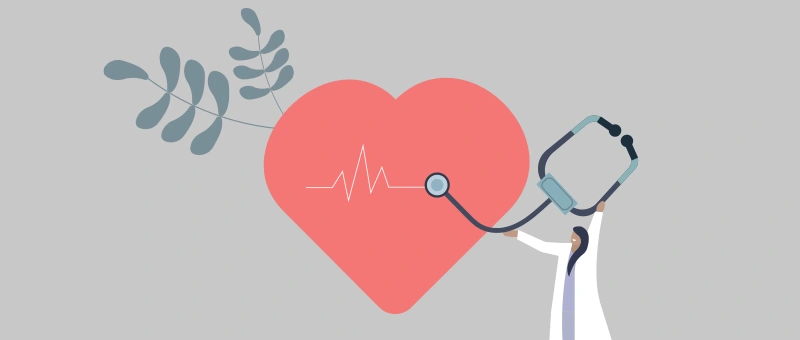How Serious is a Heart Murmur?

Heart murmurs are common. Doctors estimate they are present in 3 out of 4 children at some point during childhood. But if a doctor mentions that you or your child has a heart murmur, you are probably worried. Your healthcare provider will tell you whether you need further testing and refer you to cardiovascular medicine if needed. But in the meantime, here’s some basic information about heart murmurs and whether they are serious.
What are heart murmurs?
When the heart beats normally, it makes a sound called S1 (also called “lub”) and S2 (also called “dup”). These sounds are made by the heart valves opening and closing. The valves are flaps that act as one-way inlets and outlets in the heart chambers. When the valves close, they prevent the backflow of blood in the wrong direction. Therefore, the lub-dup sounds are a normal finding with the heart beating.
However, sometimes there are problems in the heart that prevent the blood from flowing smoothly, for example, defects in the heart’s structure. This can cause additional or unusual heart sounds, for example, whooshing or swishing noises. These sounds are called heart murmurs. They occur due to abnormal blood flow through the heart. Doctors can hear these abnormal sounds in the heart with a stethoscope.
Is a heart murmur life-threatening?
Many heart murmurs are harmless. However, some heart murmurs are caused by problems in the heart and can be potentially life-threatening if they are not treated.
What are innocent heart murmurs?
Innocent heart murmurs are harmless. They are extra sounds that occur due to blood flowing faster than normal through the heart. However, other than the blood moving fast in the blood vessels and heart, you otherwise have a healthy heart that beats normally.
What is an abnormal heart murmur?
An abnormal heart murmur occurs due to a problem with the heart, for example, a leaky heart valve or congenital heart defect. The murmur may be heard when the heart muscle is pumping blood (systolic murmur) when the heart relaxes between beats (diastolic murmur), or throughout the heartbeat (continuous murmur). People with a family history of a structural abnormality in the heart or certain types of heart disease are at a higher risk of developing an abnormal heart murmur.
What causes heart murmurs?
An innocent heart murmur occurs when blood flows faster than normal through the heart. The following conditions can cause an innocent murmur:
Intense exercise that increases heart rate
Rapid growth (for example, in babies or adolescents)
Fever
Anemia (lack of sufficient healthy red blood cells)
Untreated hypertension (high blood pressure)
Hyperthyroidism (overactive thyroid gland)
Pregnancy (there is extra blood in the body for the baby)
Abnormal heart murmurs are caused by problems in the heart, such as:
Heart infection that affects the valves (for example, endocarditis or rheumatic fever due to untreated strep throat)
Congenital heart disease (structural problems in the heart present since birth, for example, cardiac shunts or heart defects like an atrial septal defect or ventricular septal defect, also called “holes in the heart”)
Heart valve disease (problems with the heart valves causing interruptions in normal blood flow, for example, infections or mitral stenosis / aortic stenosis (narrowing of the aortic valve or mitral valve) causing aortic regurgitation or mitral regurgitation, i.e., backflow of blood)
What are the symptoms of a heart murmur?
Heart murmurs often do not cause any symptoms and are incidentally discovered when a physician listens to your heartbeat with a stethoscope. However, when there is an underlying cause, such as valve stenosis (narrowing) or damage to the heart valves, heart murmur symptoms may be present. These symptoms may include dizziness, chest pain, rapid heartbeat, fainting, shortness of breath, swelling in the arms, legs, or abdomen, sudden weight gain, a persistent cough, excessive sweating with minimal physical activity, bluish discoloration of the fingernails or lips, and swollen neck veins. Additionally, babies and children with heart murmurs can have other symptoms, such as a loss of appetite and slow growth.
When should I be worried about a heart murmur?
If you are experiencing symptoms such as chest pain, heart palpitations, difficulty breathing, shortness of breath, dizziness, or blackouts, you should tell your doctor immediately. It is important to have your heart murmur treated to prevent serious and potentially life-threatening complications.
How is a heart murmur diagnosed?
If your doctor suspects an abnormal heart murmur, they may order tests such as a chest X-ray, electrocardiogram (to check the electrical activity of the heart), echocardiogram (to observe the beating heart using sound waves), and cardiac catheterization (a minimally invasive procedure in which a catheter (flexible tube) is inserted into a blood vessel in the groin or wrist, navigated to the heart, and a dye is injected to obtain images of the heart).
How do you treat a heart murmur?
Innocent murmurs do not usually need to be treated. They tend to go away when the underlying condition that causes a heart murmur is treated, for example, with medication for an overactive thyroid gland or in pregnant women after delivery.
Treatment for abnormal heart murmurs depends on the cause and may include medications and/or surgical procedures.
Medications
Some of the medications that may be prescribed to people with heart murmurs include:
Diuretics (water pills) to remove excess fluid from the body and treat hypertension and other conditions that can worsen heart murmurs.
Angiotensin-converting enzyme (ACE) inhibitors to lower blood pressure (high blood pressure can worsen heart murmurs).
Beta blockers to reduce heart rate and blood pressure.
Antibiotics in specific situations, for example, in people with a history of heart valve infections, congenital heart defects, or artificial heart valves, as prophylaxis (prevention) before procedures such as dental treatments that can increase the risk of a heart infection.
Surgical procedures
Surgery may be recommended to treat an underlying condition that causes a heart murmur, for example, heart valve repair for a leaky valve. Heart valve surgery can be done as a minimally invasive procedure, catheter procedure, robotic-assisted heart surgery, or open heart surgery, depending on the type of valve defect.
Can you live a long life with a heart murmur?
Most people with heart murmurs live a long, healthy life. Innocent heart murmurs often go away on their own without treatment. Abnormal heart murmurs can be treated, and treatment can restore a person’s quality of life and a typical life expectancy.
References:
Like this project
Posted Sep 17, 2023
Heart murmurs are common. But if a doctor mentions that you or your child has a heart murmur, they will tell you whether you need further testing. Learn more a…
Likes
0
Views
1



